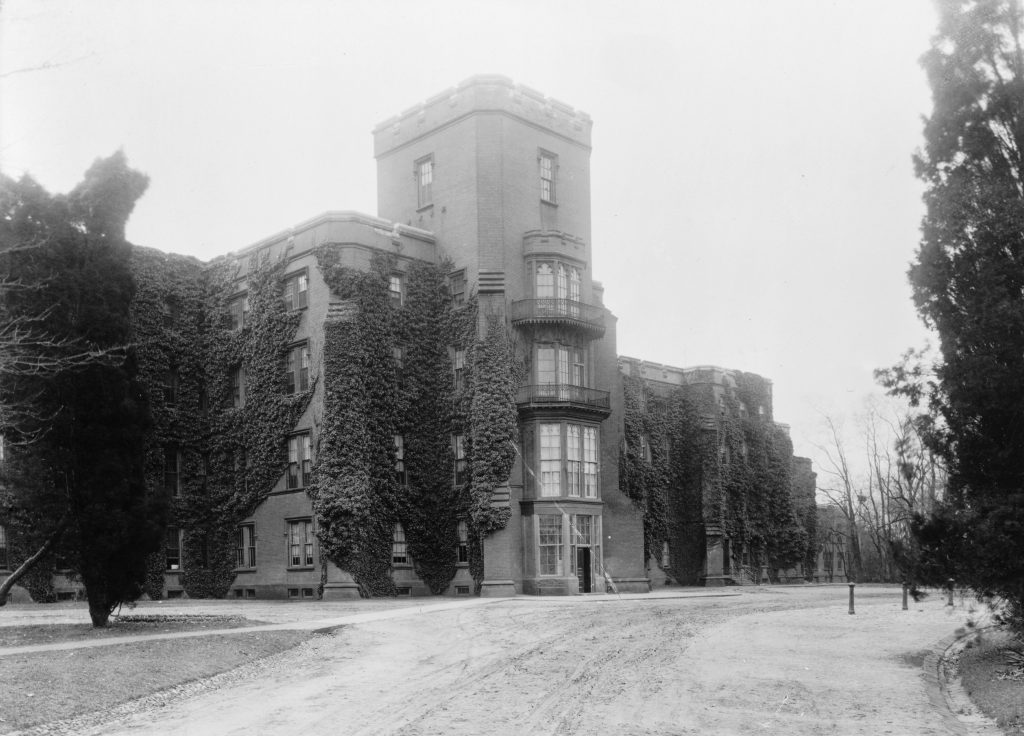“A Visit to Ezra Pound in St. Elizabeth’s Hospital, 1948,” by John Berryman, appeared in the Fall 2006 issue of MQR.
from an unpublished journal
He raced up the hall, “Bring this” at a chair halfway, and while we were settling ourselves in the end (past a close-cropt melancholic brooding on the edge of a chair against the wall), suddenly shook my hand again eagerly and said, “The only liberal writer who has come out for Truman: Wyndham Lewis!” He sank down and back then, buttoning a shirt he had thrust on, arranging objects from his pockets on the windowsill beside him, and began to eat a roll, after offering me one. Later when he went away to get some British illustrated papers about the removal of Yeats’s body to Ireland to show me, he brought back bananas, was very surprised when I didn’t want one, and rapidly ate both. “Too big,” tapping his stomach, “over 180 … 188. They send me candy and fruit.” He looks better than he did last winter, I think, though thinner everywhere except belly; less agitated in speech, but less attentive too; more coherent, a little. Certainly he remembers more. He was writing three books, he said, when he was taken, and he has just remembered recently what the third one was. (The worst thing in the cage, of which he spoke to me now for the first time, was having no work to do: he was used to thinking from two to four at night, then writing it out when he got up in the morning; and instead there was the sun on him and he trying to read Mencius in it—the FOUR BOOKS which as D. had told me and now he does, he grabbed up as the partigiani took him off.) Also he now speaks definitely of the sixteen cantos to come,—not of writing them, but of their being sixteen, and “if I can finish it,” and “Of course now I have to pull it all together … the piling up is done, no more need to put things in … but ordering. You can see where the thing is going.” I couldn’t, but he had gone on meanwhile to something else, perhaps to speak of the two “ghost-cantos,” mostly in Italian, (not lost, he thinks, but he denied that the passage in Vice Versa, which he didn’t seem to remember at all, was part of them), with the Ghibelline ghosts and a long speech in Italian giving the substance of De Monarchia. This, he said, was “off the record,” and the cantos were omitted because (I’d asked him why) “Americans wouldn’t make anything of them anyway”; but he moves away from personal subjects very quickly and as if naturally,—when I mentioned the allusions to the Paradiso in recent cantos, he just talked about the comparative inaccessibility of the third Cantiche for modern readers.
It is striking altogether how impersonal he is. Thus, it was a long time before he recalled, or came to, what he must have chiefly wanted to take up with me: my delay over the Selected Poems, & my not writing to him. And then he was very gentle, said I was taking much too much trouble with the introduction, and a look of pain went over his face when I mentioned E’s illness. “How are you?” when I asked, he put the query altogether away, saying that two hundred psychiatrists asked him this all the time. And when I congratulated him on his birthday (several days before) and said I’d wanted to send him something but had waited to find out what he specially wanted, he only looked thoughtful, and said he didn’t need anything himself, “people in Europe do,” and glanced at me as if we ought to decide at once what we could do to help. I seldom ask him questions, of course. But one more failure of self-assertion, following a question, is worth record also, as bearing on the development of English poetry.
He had been saying that he had gone to London to learn from Yeats how to write poetry, Yeats knowing more about it than anyone else. (Exactly as I did, a quarter-century later, but without Pound’s brass; and like me he had written five hundred sonnets, of which only the ten lines of “Camaraderie” are rescued by Eliot; and Yeats’s height—in the doorway at Woburn Buildings—astonished him as long afterward it did me.) He went to Yeats’s Monday evenings, and on other evenings. I said that it has seemed to me more and more, in recent years, likely that the development towards conversation in Yeats at this time must be due to his association with Pound, and asked if he thought so. Pound said “No.” He was going to see Ford in the afternoons, Ford full of poetry-as-talk. Yeats and Ford saw red at the thought of each other, but “so long as Willie didn’t know where it was coming from … I used to drill him in the evening with what I heard in the afternoon. No, papa only carried it over. Fordie gets the credit for that.”
Both gave Pound their worn-out velvet jackets, “as they got more respectable”, so he had something to wear. “Yeats’s were much better, thicker, more nap.” Lady Gregory “shoved Yeats around the drawing-rooms” for the Abbey Theatre. “Fordie saw through the Possum right away … you know that academization, intellectualism … That mass of jelly was sensitive” (pronounced very rapidly, with affection & amused wonder). Hulme “was a ‘strong personality’ … he ran his hacks with a hand. Never printed anything, you know; just said what to do. Big crowds at his place … Orage used to go. Got killed.”
“To learn how it was done” he went to Yeats—that was his phrase. “I come out of Browning, of course.” To my saying I used to think Personae the beginning of modern poetry, but now Ripostes: “Yes … yes.”
Images of Lady Gregory working up her London campaign (reading whatever novel everyone else was, seeing whatever the play was) to get money for the Abbey; of the two silences of Pound’s that he regrets, one was with Balfour and another I forget (“I never did talk much that I remember”); of Santayana and his “blue nuns” (“a life for a certain man … couldn’t stand it myself, interested in other things” & all but winked at me). Pound now sounds as if he wanted to get out of St. Elizabeths, though God knows what he wants. He dislikes being in the “derelict” ward, likes the criminals better, “more in them”; misses a very tall anti-semite with whom he used to talk before he was transferred,—“he knew all about these kikes,” glancing around and nodding as if he and I were in agreement. As compared with last winter, he scarcely ever touched this theme, however, and was less aggressive in other ways, more reminiscent, less political, only commenting that “nobody here knows how much good they did” (the Fascists). Ford’s Tietjens series, the four novels, are in the Penguins now, he says, and quoted
Seeing that long standing increases all things regardless of quality
very emphatically, with a delighted look. The loyalties of this man are very remarkable, the misapplication of his Propertius line was just a blunder. He spoke at length of an early Latin poet whom he’s just discovered in the Loeb—just fragments and two corrupt & erotic poems—one in an anthology sent him there, and he couldn’t remember the name, though trying and worrying it, shaking his head; “all Martial comes out of him.”
He urged me to stay on and on, “It accumulates, you know … I have to get rid of it”; recalled Leonie Adams’s visit,—“she wanted to find out what I knew about the Manicheans, but her friend was too voluble … I don’t know much about them anyway,” cocking his eye at me; spoke of a Ramsay from Yale, doing a book on Laforgue, who’d been to see him—“the sort of man you might want to see … I wish you could stay tomorrow”; insisted on getting the Yeats photographs from his room, and quoted excitedly in very good brogue a parody-epitaph “Under Bare Ben Bulben’s bum … ”—and waved from the barred window—“Ha!”
Image: St. Elizabeth’s Hospital in the early twentieth century.




